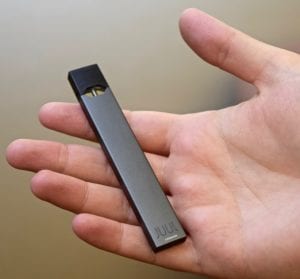Who is a member?
Our members are the local governments of Massachusetts and their elected and appointed leadership.

A Juul brand e-cigarette
Retailers have filed five lawsuits against seven Massachusetts municipalities, targeting policies enacted as health regulations to restrict the sale of certain tobacco and e-cigarette products.
Barnstable, Framingham, Somerville and Swampscott are each being sued by local retailers, while Cumberland Farms has brought a lawsuit against Barnstable, Billerica, Framingham, Sharon, Somerville and Walpole.
The municipalities have established policies that limit the sale of flavored traditional tobacco products (cigarettes, cigars and chew tobacco) and the sale of flavored e-cigarette solutions to qualifying adult-only specialty stores, typically known as tobacconists or vape shops. The stated public health purpose is to limit access to flavored tobacco and vape products and thereby reduce use among youths.
The lawsuits allege that limits on the sale of flavored tobacco or vape products to certain qualifying “retail tobacco stores” are “arbitrary and capricious” and a violation of local police powers. The suits claim that the local sales limitations are ineffective in reaching the public health goals and unfair to retailers that do not qualify as retail tobacco stores.
The suits also argue that the municipalities already have a high rate of success during compliance checks conducted by the U.S. Food and Drug Administration, so additional policies are not needed, an argument often made by opponents of tobacco and vape product restrictions.
At this time, courts have denied preliminary injunctions in the cases involving Barnstable, Somerville and Swampscott.
State law (M.G.L. Ch. 111, Sec. 31) empowers local boards of health to “make reasonable health regulations.” Over the last two decades, courts have consistently sided with municipalities regarding local tobacco control policies.
In 2013, the Federal Court of Appeals for the First Circuit upheld a Providence, R.I., ordinance that expanded on a 2009 federal prohibition on the sale of flavored cigarettes. (The First Circuit includes Massachusetts.) Providence followed federal guidelines by exempting mint, menthol and wintergreen as flavors, but expanded coverage to include all types of traditional tobacco products as well as all solutions used in e-cigarettes and vape pens.
The Providence ordinance provides an exemption for certain adult-only establishments. In Massachusetts, such establishments are “smoking bars” (hookah bars and cigar bars) or “retail tobacco stores” (tobacconists and vape shops).
Massachusetts municipalities began enacting nearly identical flavored tobacco product sales restrictions beginning in 2014. Such policies now exist in 160 cities and towns, representing two-thirds of the Commonwealth’s population.
In the past few years, school officials have seen a spike in vaping product use – notably the brand Juul – among students. Many school administrators updated their policies, but also sought help from local government. In response, local policy makers relied on a range of data and began expanding the coverage provided by the original Providence policy.
Data indicate that far more young smokers (ages 12 to 17) use menthol products than do adult smokers, and that half of young adult smokers (ages 18 to 34) began their habit with menthol products. The U.S. FDA concludes that menthol cigarettes lead to greater addiction and decrease success in quitting smoking.
Survey data for Massachusetts from the Department of Public Health indicate the following:
• 41 percent of high school students report having used an e-cigarette.
• 33 percent of high school students get their tobacco from a store.
• In 2017, one-quarter of high school students reported current tobacco and/or vape product use.
Federal agencies report that Juul use by youths is reaching epidemic proportions. The FDA is requiring the top five vape manufacturers, including Juul, to tighten their internet sales protocol to stop underage purchasing.
A related policy raised in the lawsuits is a limit on the number of local tobacco sales permits, effective in 128 cities and towns. These policies allowed existing permit holders to renew their permits and buyers of a business with a permit to “capture” the seller’s permit.
In response to a surge in the number of “vape shops,” 13 of these 128 municipalities have a general maximum number of permits to be issued and limit the number of those permits that can be issued to retail tobacco stores.